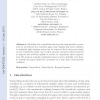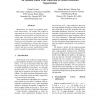1884 search results - page 41 / 377 » Simple Algorithm for Simple Timed Games |
116
click to vote
NIPS
2003
15 years 3 months ago
2003
In large multiagent games, partial observability, coordination, and credit assignment persistently plague attempts to design good learning algorithms. We provide a simple and ef´Č...
125
click to vote
CORR
2011
Springer
14 years 9 months ago
2011
Springer
We consider a consensus algorithm in which every node in a time-varying undirected connected graph assigns equal weight to each of its neighbors. Under the assumption that the deg...
135
Voted
CPM
2004
Springer
15 years 7 months ago
2004
Springer
A popular approach in comparative genomics is to locate groups or clusters of orthologous genes in multiple genomes and to postulate functional association between the genes contai...
111
Voted
NETCOOP
2009
Springer
15 years 8 months ago
2009
Springer
Abstract. Modeling the competition among telecommunication operators (or providers) as a repeated game may explain why tacit collusion to maintain high charging prices can be obser...
ICDM
2005
IEEE
15 years 7 months ago
2005
IEEE
Monotonicity is a simple yet signi´Čücant qualitative characteristic. We consider the problem of segmenting an array in up to K segments. We want segments to be as monotonic as po...


